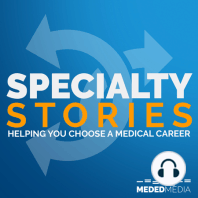57 min listen

51: What is Neuro-Ophthalmology? How Do You Become One?
51: What is Neuro-Ophthalmology? How Do You Become One?
ratings:
Length:
23 minutes
Released:
Nov 29, 2017
Format:
Podcast episode
Description
Session 51 Dr. Bryan Pham is a community based neuro-ophthalmologist who is fresh out of training. He discuses the field and what drew him to it and so much more. First off, please check out all our other podcasts on MedEd Media. [01:30] Interest in Neuro-Ophthalmology Bryan recalls having a difficult time in his neurology residency that got him disenfranchised.It was the end of his first year in neurology, which was the beginning of his second year that he had a very busy workload without a real break. And the next rotation coming up was neuro-ophthalmology. And for him, that rejuvenated his love for medicine and for neurology. He likes the wide variety of disease being able to see all different areas in neurology represented within neuro-ophthalmology. There are strokes that affect vision and there are movement disorders of the eyes. My wife, Allison, is also a neurologist and I remember in her first year of neurology is her second year of postgraduate training. And then your junior of neurology, she was destroyed that year. So this is not an uncommon thing. So expect this if you're going into Neurology. "The first year of Neurology, the PGY-2 year, tends to be the most difficult for everybody." [03:07] Traits that Lead to Being a Good Neuro-Ophthalmologist Bryan says that to be a good neuro-ophthalmologist, you have to take the time to think over the patient. It's a cerebral field. Not too much in terms of procedures, but he likes the mystery of patients and trying to figure that out. Being a neuro-ophthalmologist, you're not actually operating on patients or conditions. Bryan explains that there are also neuro-ophthalmologists that do additional training in occulo-plastics. Other specialties in the running for fellowship training, Bryan also considered neuro-intensive care. But he realized he doesn't really like terribly sick patients and the intensity of it. [04:42] Types of Patients and Neuro-Ophtho versus Ophthalmology Bryan describes that one-third of the brain volume is dedicated to vision. We see essentially everything that can affect vision that doesn't come from the eye itself. These could be strokes affecting areas of the brain causing vision loss as well as different abnormalities. "Anything that affects the brain can and often does affect vision." Bryan explains their bread and butter diagnosis is a condition called idiopathic intracranial hypertension or pseudotumor cerebri. It is where the pressure in the brain builds up that it can lead to vision loss when it puts pressure on the optic nerves causing them to swell. Nothing in the eye itself is abnormal, the problem is further. So any conditions where the eyeball itself is normal but the vision is affected would be appropriate for a neuro-ophthalmologist. Bryan says he often gets referrals from his colleagues in ophthalmology but he also gets a few from primary care physicians. [06:17] The Residency Path There are two ways going to residency. One is the neurology residency and the other is an ophthalmology residency. Because it's a non-surgical subspecialty, it is an option through neurology. You do the typical neurology or ophthalmology residency and then followed by a year of fellowship in the neuro-ophthalmology. But it's a nonsurgical fellowship. The joke in Neurology is finding the lesion and knowing the location, or localizing the lesion. But then not being able to do anything about it. In Neuro-Optho, there are also common jokes related to this. But Bryan clarifies that there are some things that they're able to treat and cure. One example is benign paroxysmal positional vertigo. Nevertheless, Bryan admits their subspecialty is the "diagnose and adios!" [07:50] Typical Week and Community versus Academics Currently, Bryan deals with 80% general neurology and 20% neuro-ophthalmology. There are neuro-ophthalmologists that do it full-time but they generally consist of essentially a full day of clinic. There are consults they need to do in the hospital depen
Released:
Nov 29, 2017
Format:
Podcast episode
Titles in the series (100)
6: A Private-Practice Nephrologist Talks About Her Job: Dr. Robey is a private-practice nephrologist in Arizona. She shares what it takes to be a nephrologist and why she likes it so much. by Specialty Stories